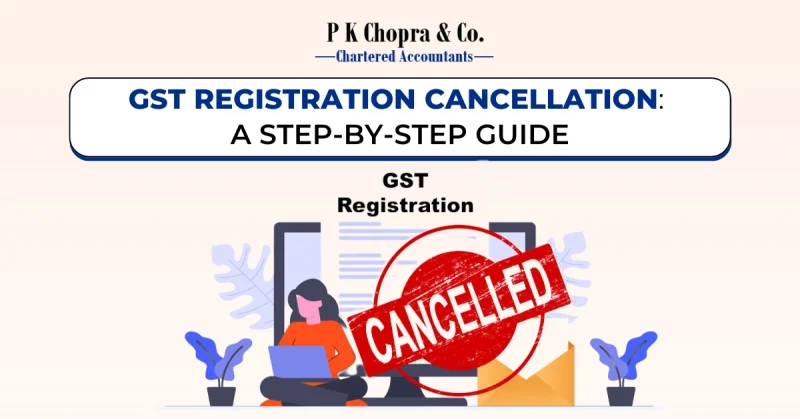GST Registration Cancellation: A Step-by-Step Guide
Introduction
In the realm of taxation, the Goods and Services Tax (GST) has transformed business operations. Just as there are procedures for obtaining GST registration, there are also specified processes for its cancellation. Understanding GST registration cancellation is essential for businesses to maintain compliance and manage risk. This guide provides a detailed, step-by-step look at the provisions, circumstances, and procedures involved in canceling GST registration.
Provisions Governing GST Registration Cancellation
The Central Goods and Services Tax Act, 2017, and its relevant rules primarily govern GST registration cancellation. Key provisions include:
- Section 29: Cancellation or suspension of registration.
- Rule 20: Application for cancellation of registration.
- Rule 22: Cancellation of registration.
Applicability of GST Registration Cancellation
Under Section 29 of the CGST Act, 2017, GST registration can be canceled in two scenarios:
- On the Motion of the Proper Officer: The officer may initiate cancellation if deemed necessary.
- Upon Application by the Registered Person: A registered individual or their legal heirs (in case of death) can request cancellation.
The law empowers the proper officer to cancel registration under specified circumstances.
Circumstances Leading to Cancellation by Proper Officer
According to Rule 21 of the CGST Rules, 2017, the proper officer may cancel GST registration under the following circumstances:
- Non-conduct of business from the declared place.
- Issuing invoices without actual supply of goods/services.
- Violation of anti-profiteering measures or related rules.
- Breach of rules regarding bank account details or electronic credit ledger.
- Improper availing of input tax credit.
- Discrepancies between GSTR-1 and GSTR-3B filings.
- Failure to file GSTR-3B returns for consecutive periods.
- Failure to file quarterly returns in GSTR-3B.
- For composition scheme dealers: non-filing of returns for three consecutive tax periods.
- For other registered persons: non-filing of returns for six consecutive months.
- Non-commencement of business within six months of registration.
- Registration obtained through fraud or misstatement.
Procedure for Cancellation by the Proper Officer
When the proper officer believes cancellation is warranted, the following procedure (as per Rule 22 of the CGST Rules, 2017) is followed:
Issuance of Show Cause Notice (Form GST REG-17)
The officer issues a notice to the registered person, outlining the reasons for potential cancellation.
Response by Registered Person (Form GST REG-18)
The registered individual has seven working days to respond to the notice, providing explanations or evidence.
Order for Cancellation (Form GST REG-19)
If unsatisfied with the response, the officer issues an order within 30 days, canceling the registration.
Proceedings Dropped (Form GST REG-20)
If the officer is satisfied with the reply, proceedings are dropped.
Application for Cancellation by the Registered Person
Registered persons can also initiate the cancellation process. Here’s how:
Filing the Application (Form GST REG-16)
The registered person must submit an application for cancellation. The form requires details like stock held, liabilities, and reasons for cancellation.
Verification and Approval
The proper officer reviews the application. If satisfied, the cancellation is processed; otherwise, further inquiries may be made.
Post-Cancellation Compliance
After cancellation, the business must:
- File Final Return (Form GSTR-10): This includes details of closing stock and tax payable on it.
- Settle Outstanding Liabilities: Ensure all due taxes and penalties are paid.
Navigating Cancellation Procedures
For businesses, understanding the intricacies of GST registration cancellation is crucial for compliance and risk management. Given the complexity of GST laws, seeking assistance from professionals offering GST-related services can be invaluable. These services may include:
Legal Consultation
Expert guidance on GST laws, compliance, and procedural matters.
Application Assistance
Help with filing applications for cancellation or responding to show cause notices.
Representation
Representation before tax authorities in case of disputes or appeals.
Compliance Management
Ensuring ongoing compliance with GST regulations to avoid cancellation risks.
Businesses can benefit from specialized services tailored to their specific needs and the nuances of local tax regulations.
Conclusion
Cancellation of GST registration involves a detailed process governed by specific provisions and rules. Businesses must be aware of these procedures to avoid non-compliance and associated penalties. Seeking assistance from professionals offering GST-related services can provide the necessary expertise and support to navigate these complexities effectively. By understanding the rules and accessing the right resources, businesses can ensure smooth operations within the GST framework.
FAQs
1. What are the reasons for GST registration cancellation?
Reasons include non-conduct of business, issuing fake invoices, violation of anti-profiteering measures, and non-filing of returns, among others.
2. How can a registered person apply for GST cancellation?
A registered person can apply by submitting Form GST REG-16, detailing stock held, liabilities, and reasons for cancellation.
3. What happens if I don’t respond to a Show Cause Notice for cancellation?
Failure to respond may result in the proper officer canceling your GST registration.
4. What is the final return after GST cancellation?
The final return (Form GSTR-10) includes details of closing stock and tax payable on it, ensuring all liabilities are settled post-cancellation.
5. Can GST registration be restored after cancellation?
Yes, if the cancellation was voluntary or on the application of the registered person, re-registration is possible through a fresh application.

